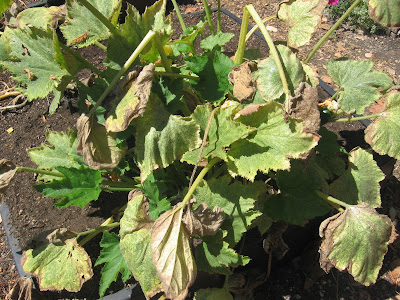
Years ago I saw an episode of the X-Files in which Scully and Muldur were dispatched to the Pacific Northwest to investigate the mysterious disappearance of several forest rangers. After the discovery of mummified remains and the usual series of nail-biting close-calls, the culprits were revealed to be clouds of tiny, alien, insect-like creatures descending from the tall evergreens to engulf unwary passers-by in cocoons of gossamer webbing. Once engulfed, the hapless victims were slowly relieved of their vital juices until nothing was left but a dessicated husk.
Something similar is happening in our garden this summer. Not to worry: we haven't lost any friends or family members. So far, thank goodness, the only victims are the beans and the zucchini.
I know it's just spider mites, not an alien invasion, but there is a sense of helpless horror in seeing the bean vines covered in webbing and slowly succumbing to a lethal infestation.
The whole crop of Kentucky Blues is a lost cause. They've been watered well and sometimes I follow the standard advice to hose them down to wash away the minuscule mites. It hasn't done a bit of good.
The first sign of trouble was a tell-tale stippling on the leaves. The mites -- not insects, but arachnids related to spiders and ticks -- live in colonies on the undersides of leaves and stick their mouth parts like little straws right into the cells of the leaves and suck them dry.
We've had this problem before but not so severely, just some spotting here and there. This year the leaves are so thoroughly stippled they change color and slowly dry out before dropping off.
The Green Bush zucchini, which was on its way to a very productive season, has been stopped in its tracks. The oldest leaves are dying and the new young leaves will no doubt get paler and paler before perishing like those unfortunate rangers in the fictional forests. Where are Scully and Muldur when you need them!
It's hard to believe that a creature barely visible to the naked eye can do such damage to the huge zucchini leaves, not to mention the entire bean crop. But in good times, such as the hot dry days of a California summer, a spider mite can go through its whole life cycle in a week. The population explodes exponentially. When one plant can no longer support the horde, the female mites float on a strand of webbing to a new adjacent plant with its as yet unmolested leaves. And, to make things worse, they can overwinter in mild areas like ours, ready to come right back next season as soon as conditions are right.
I can't quite remember what Scully and Mulder did to save the day -- I think it had something to do with shining bright lights on the alien beings, who only appeared in the dark of night. But something needs to be done.
My plan is to try compost tea and rock powder. Build the soil; save the plants. We'll see.




No comments:
Post a Comment